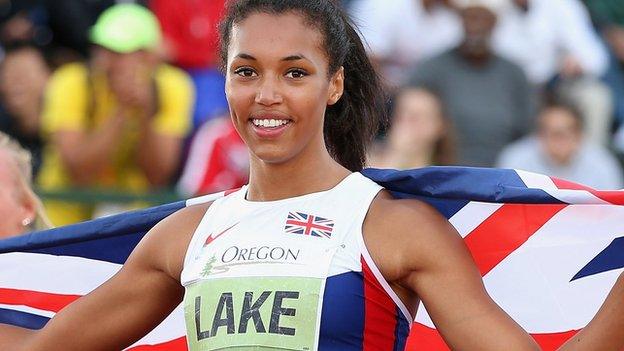Glasgow 2014: Meet Judd and Williams, the next generation
- Published
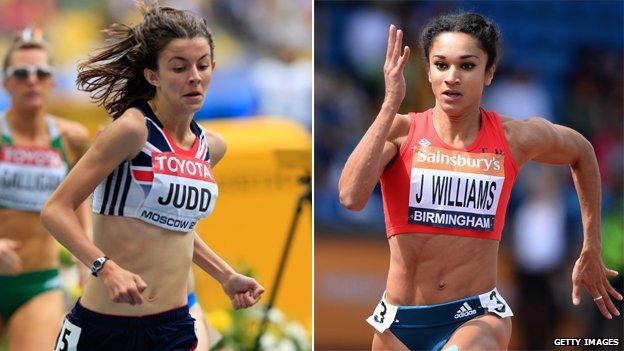
Jess Judd and Jodie Williams are looking to fill the shoes of champions before them
While Usain Bolt's arrival in Glasgow proved the incomparable draw of established superstars, Commonwealth Games have always been as much about the next generation as the present.
It is where young talent that will one day dominate first serves notice of what is to come: Daley Thompson winning decathlon gold in Edmonton in 1978 at 20; Denise Lewis, at 21, taking her first major international title in Victoria in 1994; Colin Jackson, also 21, winning sprint hurdle silver in Edinburgh, two years before doing the same at the 1988 Olympics.
Hoping it is their turn this time around are Jess Judd and Jodie Williams. One is 19 with the 800m pedigree of a woman in maturity. The other is a 20-year-old in search of her teenage kicks. Both have discovered that nothing will come without sacrifice.
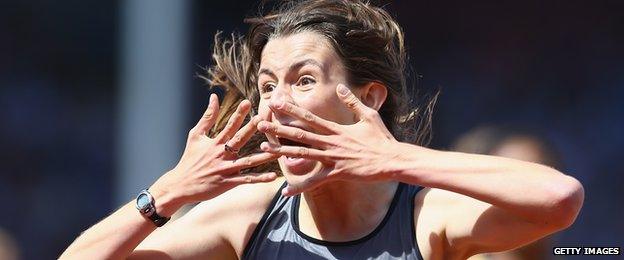
Judd won her first Diamond League race in Birmingham in June 2013
"I love the pain of 800m running," says Judd, the Essex girl whose disarming disposition hides a core of steel. "I think I'm a bit sadistic. If I'm not ill at the end of a session, I think I haven't pushed myself enough. If I'm not lying on the ground, I haven't gone through the boundary.
"My coach has to hold me back, otherwise I'd go into every session and try to kill myself. It was probably watching Paula Radcliffe push herself to the limit. I thought: that's what I've got to do to succeed."
Judd shocks crowd in thrilling 800m win
Judd has done a lot for someone so young. It should be just the start.
Running with her long hair flapping loose, teenage limbs yet to fill out, the girl from Canvey can appear callow to the casual observer.
Physically, there is much more to come. Mentally, she is already evolving fast.
"When I go for my runs along the sea wall, I always think about someone being on my shoulder," she says.
"When I'm doing specific 800m work on the track, I always imagine commentary in my head. Coming down the last 100m of a rep, I imagine I have to hold everyone off. It spurs me on.
"I train with boys and I'm not intimidated by them. So if I can use that same mentality in races, I should do well.
"Nothing can beat the feeling of crossing the line being absolutely exhausted and knowing you've given it everything you've got."
Jessica Judd |
|---|
Age: 19 |
Her 800m personal best: One minute 59.77 seconds (June 2014) |
Trains: Chelmsford |
Honours: 800m World Youth bronze 2011, 800m World Junior silver 2012 |
Races: 800m heats, Wednesday morning |
In the case of 200m sprinter Williams, these Commonwealths represent a second coming of age as much as first opportunity.
She was the golden junior of her generation, her unbeaten sprint record stretching back five years and 151 races.
At both World Youth and World Juniors, she dominated. The transition to senior success has taken longer.
Injuries intervened, first before the London Olympics and again last winter. And with them came doubt, first from outside and then from within.
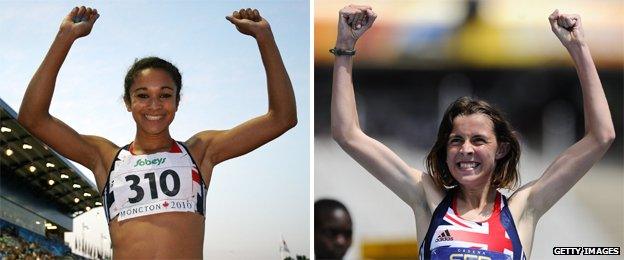
World Junior medallists in their respective events, Williams and Judd have shown promise for a while
"It makes it much harder when you've done so well in the juniors, because there's so much more pressure on you," she says, without self-pity.
"In 2012, there was a lot of pressure on me. Everywhere I went people wanted to talk to me about the Olympics, so not to make that team was a real struggle. I don't think I've got over it still. It haunts me to this day."
Both went to the World Championships last summer in hope more than expectation. Williams could do no better than fourth in her 200m heat. Judd was fifth in her 800m first round. Both left Moscow distraught.
"The winter of 2013 was a real struggle," admits Williams. "Coming back from that mentally has been the hardest thing.
"Once you've had a hit like that, it's hard to get it back. You know your body is fit and well, but you don't know whether you'll be able to run those times you could before the injury.
"It's one thing your body being fit and another getting that mental confidence back. I think that's what I've been trying to build up this year."
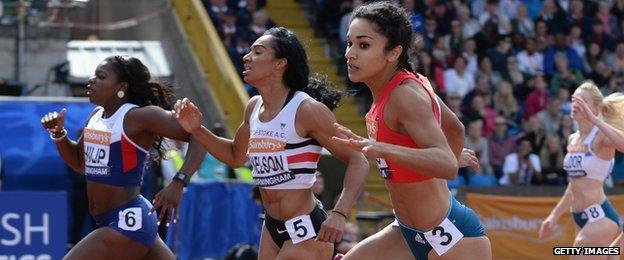
Williams (right) is matching results of much more mature runners
Judd can empathise. "I came onto the scene and everything seemed to be going really well and then one injury later it totally changed," she says.
"You never think you're going to fail. It was soul-destroying. I vowed it would never happen again. It gave me the incentive to work harder."
Even with their senior careers still to blossom, both have Commonwealth experience running through them.
Judd was introduced to athletics by Lisa, the wife of fellow Canvey native Dean Macey,, external who won Commonwealth decathlon gold eight years ago in Melbourne and has acted as an insanely competitive inspiration to her ever since.
She is coached now by Rob Denmark, another Essex express, who won 5,000m gold at the Commonwealths of 1994.
Williams, in turn, was coached through her extraordinary unbeaten run by wise old owl Mike McFarlane, winner of Commonwealth 200m gold 32 years ago in that famous dead-heat with Alan Wells.
The aims for both here in Glasgow are similar: make the final first, then see what happens. Both have run personal bests this summer. Both would like to improve on them again, if not here then at the European Championships which follow a fortnight later in Zurich.
Jodie Williams |
|---|
Age: 20 |
Her 200m personal best: 22.60 seconds (June 2014) |
Trains: Lee Valley |
Honours: 100m and 200m World Youth gold 2010, 100m and 200m World Junior gold 2011 |
Races: 200m heats, Wednesday evening. |
"I wanted to get rid of my 100m and 200m PBs, because they've been hanging around for four years," says Williams. "Sixteen-year-old Jodie cannot be faster than 20-year-old Jodie. That's just not right.
"There was a lot of talk about me just being another junior to add to the list; that I would never make it to the seniors. That was really hard to take.
"I was already struggling. Then to hear all those things about you… I obviously doubted myself a lot. I was really doubting whether I could make it back onto the track. To come out this year and be performing well is a massive confidence boost."
Her struggles have left indelible physical marks. "Pain is temporary," says a tattoo on one wrist. "Victory is forever," says one on the other.
"It pushes me through training, because you know when you come through it all, when you're standing on the podium listening to the national anthem, you forget all the pain."
Then there are the elephants on her ankle. A strange choice for one obsessed with speed? There is the logic of the young veteran here, too.
Williams once had a lucky toy elephant, brought back by a friend from Thailand, that accompanied her to those 151 undefeated races. Just before the 152nd, the 200m final at the World Juniors three years ago, the elephant disappeared. So, too, did her unbeaten run.
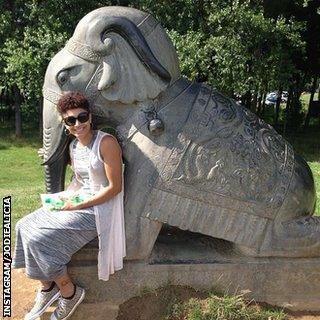
Superstitious Williams blamed a lost elephant trinket for the loss of her first race in 152
"I know it sounds crazy, but I blamed the elephant," she says. "So I had it tattooed on my ankle, so I could never again lose my elephants."
Judd has her own secret weapon. Whenever she needs it, she can pick up her mobile and call another Commonwealth champion: Radcliffe, Commonwealth 5,000m champion in Manchester 12 years ago, now mentor to those inspired by her example.
"She's always been my idol, my role model," says Judd, still clearly star-struck. "I used to see her on posters around the place. She showed how strong women could be. I loved the way she could push herself.
"I can't believe that I've come so far in running that I can speak to her. The 10-year-old me would never have believed it.
"Especially when I was injured, I was really disappointed with how I was doing. Being able to talk to her is amazing. If I've run well or badly, it's great to be able to phone her up and talk through the race.
"I used to feel intimidated. I didn't have enough confidence in myself, so I never really raced to win. Now I do. I run every race to win."
- Published27 July 2014
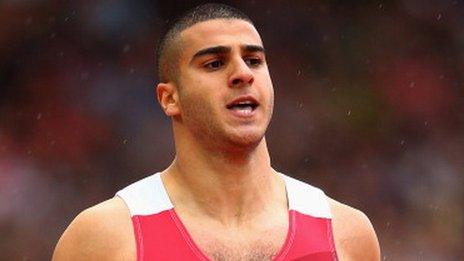
- Published26 July 2014
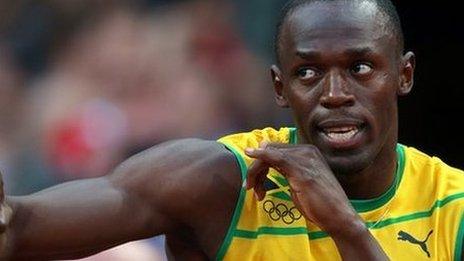
- Published30 April 2014
.jpg)
- Published24 July 2014
